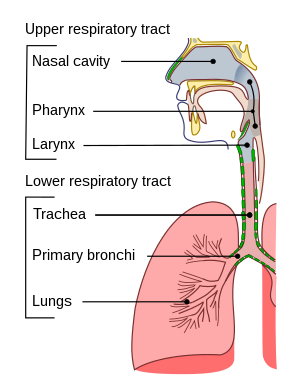Lower respiratory infections
| Lower respiratory tract infection | |
|---|---|
 |
|
| Conducting passages. | |
| Classification and external resources | |
| Specialty | pulmonology |
| ICD-10 | J10-J22, J40-J47 |
'Lower respiratory tract infection (LRTI), while often used as a synonym for pneumonia, can also be applied to other types of infection including lung abscess and acute bronchitis. Symptoms include shortness of breath, weakness, fever, coughing and fatigue.
There are a number of symptoms that are characteristic of lower respiratory tract infections. The two most common are bronchitis and pneumonia.Influenza affects both the upper and lower respiratory tracts.
Antibiotics are the first line treatment for pneumonia; however, they are not effective or indicated for parasitic or viral infections. Acute bronchitis typically resolves on its own with time.
In 2013 there were about 150 million LRTIs. These resulted in 2.7 million deaths down from 3.4 million deaths in 1990. This was 4.8% of all deaths in 2013.
Bronchitis describes the swelling or inflammation of the bronchial tubes. Additionally, bronchitis is described as either acute or chronic depending on its presentation and is also further described by the causative agent. Acute bronchitis can be defined as acute bacterial or viral infection of the larger airways in healthy patients with no history of recurrent disease. It affects over 40 adults per 1000 each year and consists of transient inflammation of the major bronchi and trachea. Most often it is caused by viral infection and hence antibiotic therapy is not indicated in immunocompetent individuals. Viral bronchitis can sometimes be treated using antiviral medications depending on the virus causing the infection, and medications such as anti-inflammatory drugs and expectorants can help mitigate the symptoms. Treatment of acute bronchitis with antibiotics is common but controversial as their use has only moderate benefit weighted against potential side effects (nausea and vomiting), increased resistance, and cost of treatment in a self-limiting condition. Beta2 agonists are sometimes used to relieve the cough associated with acute bronchitis. In a recent systematic review it was found there was no evidence to support their use.
Acute Exacerbations of Chronic Bronchitis (AECB) are frequently due to non-infective causes along with viral ones. 50% of patients are colonised with Haemophilus influenzae, Streptococcus pneumoniae or Moraxella catarrhalis. Antibiotics have only been shown to be effective if all three of the following symptoms are present: increased dyspnoea, increased sputum volume and purulence. In these cases 500 mg of Amoxycillin orally, every 8 hours for 5 days or 100 mg doxycycline orally for 5 days should be used.
...
Wikipedia
